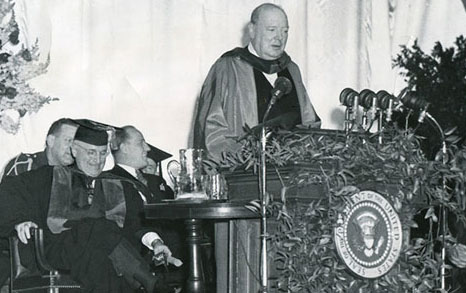Special to WorldTribune , March 6, 2020
Commentary By Lee Cohen
A January 2020 Gallup poll indicated over three-quarters of Democrats would vote to elect a socialist president. You read that correctly. Right here in the good old USA. We need to pay attention to history—not the history agenda being taught in most American schools and universities—to understand just how alarming this data is.
On March 5, 1946, in Fulton, Missouri, Winston Churchill delivered one of the most important addresses of his life. Though 74 years have passed, if we consider the previously-mentioned Gallup poll, Churchill’s message alerting the world to the existential dangers of totalitarianism and socialism is needed as much today.

In a nation that found the ideas of totalitarianism and soviet-influenced political systems anathema two generations ago, the American public, particularly the Democrats among them, would do well to pay attention to Churchill’s prophetic speech. Those Americans drawn to socialism are perhaps ignorant of the death toll committed in the name of totalitarianism — estimated to be 100 million — as well as the way socialism and communism demean individuals and degrade human life.
Introduced by President Truman, Churchill delivered the “Sinews of Peace” speech at Westminster College in Fulton, Missouri. Fresh from saving the Free World from domination by the Nazis, Britain thanked the great leader by voting him out and installing an opposition party that eventually orchestrated loss of global power and national decline thanks to its socialist programs.
With a vision only his unique vantage point provided, Churchill warned the world from Fulton: “From Stettin in the Baltic to Trieste in the Adriatic, an iron curtain has descended across the Continent…seeking everywhere to obtain totalitarian control.” He emphasized that he had seen this before in the run-up to World War II, but no one heeded his words: I saw it all coming and cried aloud to my fellow countrymen and the world, but no one paid attention…It could have been prevented, in my belief, without the firing of a single shot… but no one would listen, and one by one we were all sucked into the awful whirlpool.”
In order to push back against the global domination of Stalin’s Iron Curtain, Churchill called for a new Western alliance, including global organizations committed to peace-keeping. At the time he was a strong advocate of a post-war European community committed to this purpose. However, Churchill would have been appalled to see the eventual trajectory of the supranational, political European Union which compromises the sovereignty of its member states. Churchill knew what it was to go it alone, and in the light of the evolution of the EU, he would have been disappointed and approved of Brexit with the UK striking out on its own steam to form alliances on its own terms and manage its own borders.
On the other hand, Churchill would be encouraged by the current state of the U.S.-UK relationship and full of hope for the trade agreement currently being negotiated in London and Washington. It was, after all in the 1946 Fulton speech in which he coined the phrase “Special Relationship’ to reflect a US-UK alliance based upon a compassionate world view underpinned by “the great principles of freedom and the rights of man which are the joint inheritance of the English-speaking world,” reinforced by the resources of our combined economic and military might.
It is difficult to exaggerate the significance of the Fulton speech. Indeed, one of the UK’s greatest historians, Churchill scholar Andrew Roberts wrote: that ‘Sinews of Peace’ and another speech Churchill delivered in the same year in Zurich ”created the political architecture for the whole postwar period. To a very great degree, the geostrategic world we inhabit today sprang from the words Churchill spoke at Fulton, Missouri and Zurich, Switzerland.”
Ronald Reagan and Margaret Thatcher were excellent custodians of Churchill’s post-war legacy and they shared his concerns. Their mutual belief in the importance of the Anglosphere’s role to preserve global stability, as well as their mutual opprobrium of totalitarianism, guided their mission to defeat Soviet communism
Today’s leaders, Trump and Johnson are good custodians of Churchill’s vision in a different way. Both of these men, like Winston before them, believe in the fundamental greatness of their nations. Though the years have ticked by, Churchill’s concerns are as valid as they were 74 years ago. Undemocratic forces continue to plague the world. Churchill’s words serve as inspiration and guide. They should be required reading in schools if only our educational institutions were focused on the right things. And if that happened, we wouldn’t have alarming sectors of the public even considering voting for a socialist.
Lee Cohen is a fellow of the Danube Institute. He was an adviser on Europe to the U.S. House of Representatives Foreign Affairs Committee and founded the Congressional United Kingdom Caucus.
Intelligence Brief __________ Replace The Media
